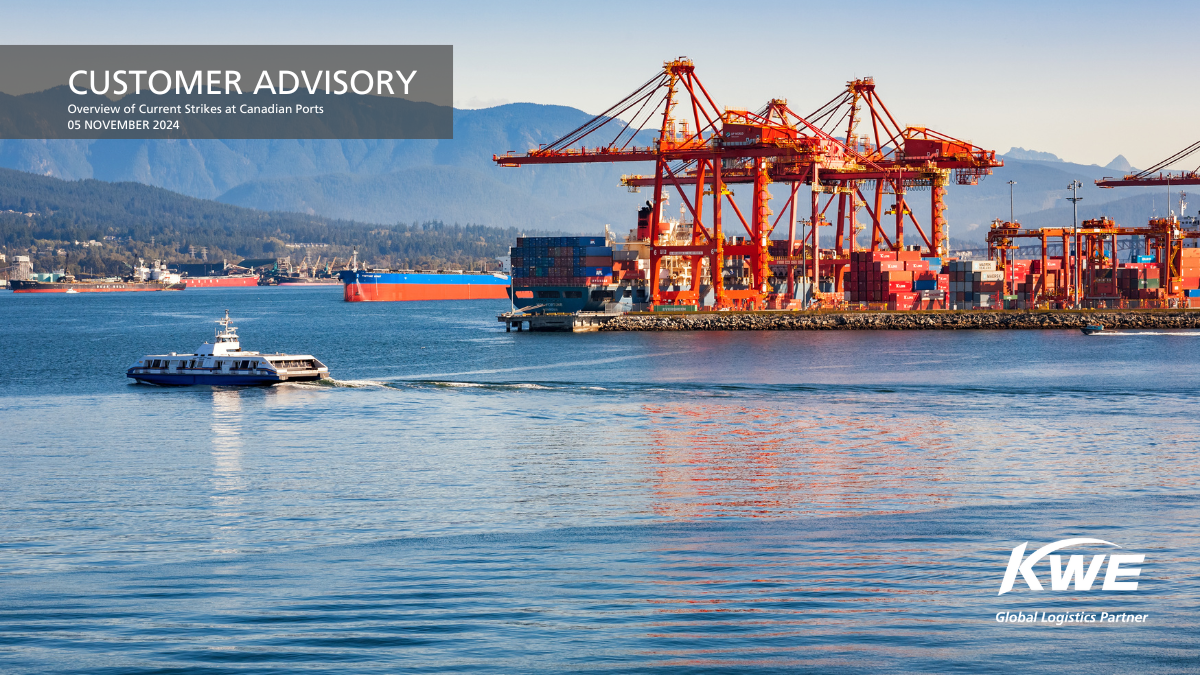Quote
Overview of Current Strikes at Canadian Ports

Labor strikes at Canadian East and West Coast ports are leading to significant operational and logistical challenges, affecting both national and cross-border trade. These strikes, fueled by ongoing labor disputes, are halting cargo movement, impacting rail and intermodal operations, and adding strain to North American supply chains. The situation remains fluid, with potential for escalated disruptions if no agreement is reached soon.
West Coast Strike: British Columbia
- Ports Affected: Vancouver and Prince Rupert.
- Start Date: The most recent disruptions began on November 1st, 2024, when employers implemented a lockout across British Columbia’s West Coast ports in response to labor actions.
- Impact: Vancouver, Canada’s largest port, and Prince Rupert, a major gateway for trans-Pacific trade, have seen halted container and bulk cargo handling, creating a bottleneck for rail and trucking networks. With no quick resolution, this has led to significant backlogs, affecting goods movement throughout western Canada and potentially into the United States.
- Rail Embargo by CPKC and CN: Canadian Pacific Kansas City Limited (CPKC) and Canadian National Railway Company (CN) placed an embargo on rail shipments destined for multiple Vancouver terminals temporarily blocking exports and imports from Canada, the U.S., and Mexico. CPKC is allowing restricted rail traffic through a permit system to help manage available capacity.
East Coast Strike: Quebec
- Ports Affected: Port Montreal – Viau and Maisonneuve Terminals operated by Termont are on an indefinite strike. Racine and Cast Terminals operated by MGT are currently operating under normal business hours, but overtime is restricted.
- Start Date: The most recent disruption began on October 31st, 2024 at Viau and Maisonneuve Terminals. Labor tensions have escalated as the Maritime Employers Association (MEA) and the International Longshoremen’s Association (ILA) failed to reach an agreement, causing sporadic strike actions and work stoppages.
- Impact: Montreal, a key hub for eastern Canada and a vital link in the supply chain, is experiencing delays that ripple into rail and road transport. The disruptions here affect containerized goods bound for the U.S. Midwest, especially in sectors such as automotive and consumer goods.
- Rail Operations Suspended: CN has suspended rail operations at Montreal Gateway Terminal (MGT) at Cast and Racine facilities until further notice, due to operational constraints and uncertainty.
Broader Impacts on Logistics
- Rail Delays: Canadian rail networks, including those operated by CN and CP, are experiencing disruptions as rail lines are crucial for moving goods inland from both the East and West Coasts.
- Increased Costs: The shipping industry faces rising costs as cargo is rerouted or delayed, impacting downstream sectors and potentially increasing consumer prices.
- U.S. Trade: With Canada as a major trade partner, especially for the United States, these strikes are affecting U.S. importers relying on Canadian ports for access to Asian and European markets. Some U.S. ports may see increased traffic as shippers reroute cargo.
KWE will continue to provide timely updates and support to ensure the continuity of your cargo operations.
For further assistance, please contact your KWE representative.
Sources: